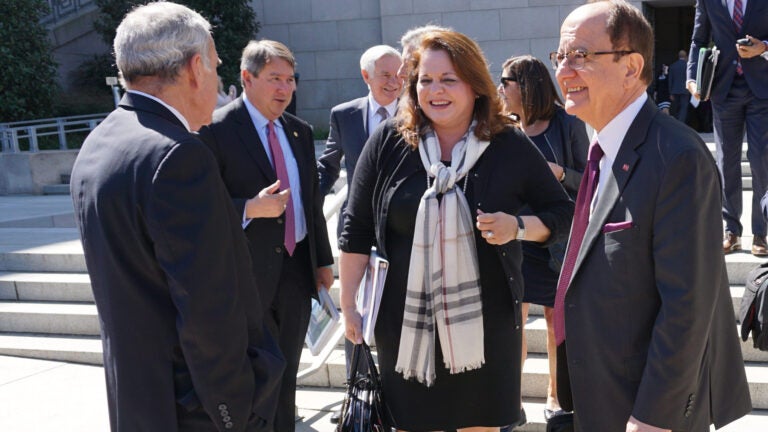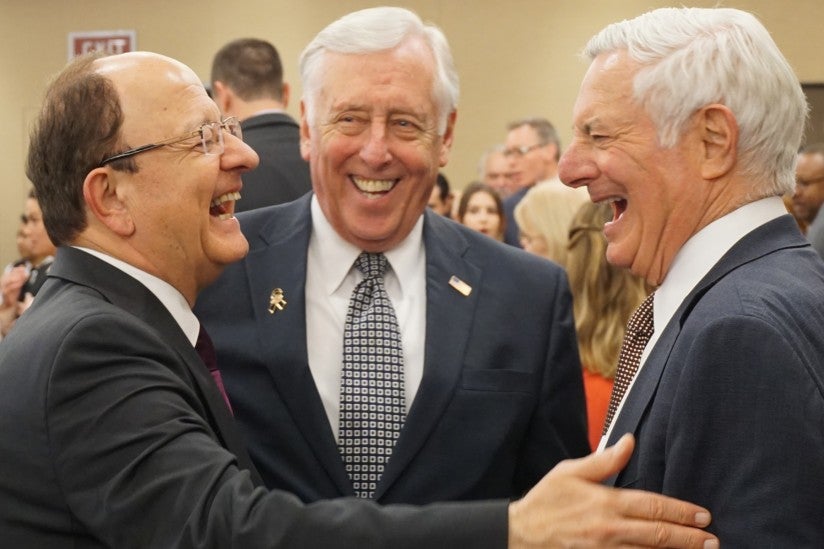
Trustee Lisa Barkett and USC President C. L. Max Nikias chat on Capitol Hill. (Photo/Eric Abelev)
Financial aid for low-income students tops USC agenda in Washington
Delegation led by USC president and provost covers higher education with Capitol Hill legislators
WASHINGTON — USC President C. L. Max Nikias and Provost Michael Quick led a delegation of trustees and senior administrators to Washington, D.C., where they addressed several higher education priorities with a bipartisan group of legislators on Capitol Hill.
Topping the agenda was financial aid for low-income students. USC, which maintains a “needs-blind” admission policy, enrolls more low-income undergraduate students than any other highly selective, private university in the country.
To achieve this, USC offers a need-based financial aid package averaging $32,291 to undergraduate students, committing more than $300 million annually in overall financial aid from its own sources. The Pell Grant program, a federal grant of up to $4,860 for low-income undergraduate students, supplements this aid, but faces decreased funding support.
USC will continue investing in financial aid because we want to attract the best and brightest, regardless of background.
C. L. Max Nikias
“USC will continue investing in financial aid because we want to attract the best and brightest, regardless of background,” Nikias said. “Pell Grants enable us to reach a larger base of students who require financial assistance to pursue their studies. I was encouraged that the lawmakers we spoke with likewise see the value this kind of aid delivers to the students who need it most, and I hope we will be able to count on their support in the future.”
Delegates also addressed the strategic imperative of permanently repealing sequestration to ensure continued funding for key research in areas such as cancer, Alzheimer’s, blindness, cybersecurity and next-generation post-traumatic stress disorder treatment for returning veterans.
Fiscal challenges
USC’s annual research expenditures top $700 million, including more than $421 million from the federal government.

“Over the long term, America’s fiscal challenges cannot be adequately addressed through cuts that diminish our ability to innovate,” Quick said. “By prioritizing critical investments in scientific research and higher education, we can better protect our position as a leading global innovator and ensure the sustained health of our nation’s economic future.”
USC delegates addressed their concerns with legislators from both the upper and lower chambers, including Sen. Dean Heller (R-Nev.), Minority Leader Nancy Pelosi (D-Calif.) and Reps. Lucille Roybal-Allard (D-Calif.), Karen Bass (D-Calif.), Loretta Sanchez (D-Calif.), Mimi Walters (R-Calif.) and Michael McCaul (R-Texas and chairman of the Homeland Security Committee).
Following the day’s meetings, Nikias hosted a reception on Capitol Hill for 200 guests, including local alumni and elected officials. He updated the group on a number of key developments, including the construction of USC Village and the university’s recent recognition by the White House as one of the nation’s top destinations for Pell Grant eligible students.
